Photo
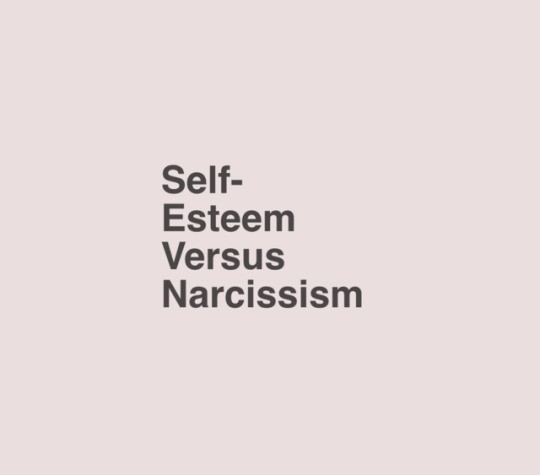
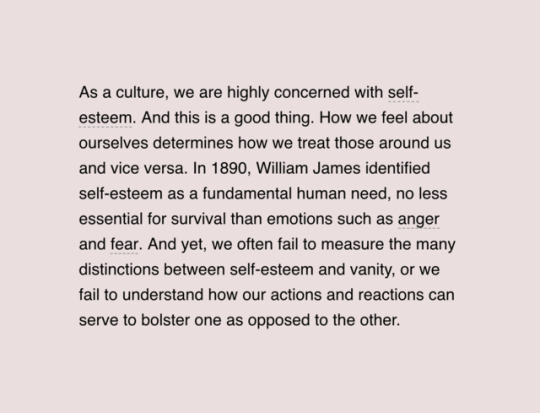
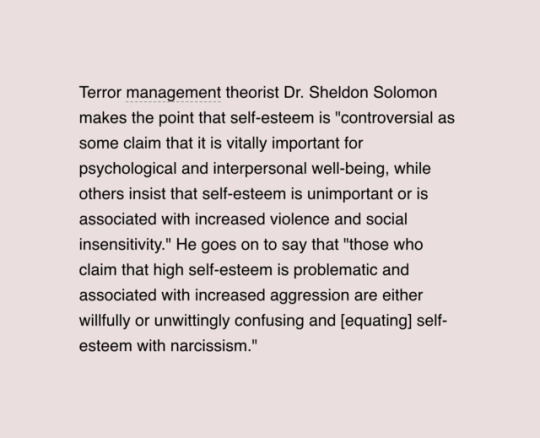
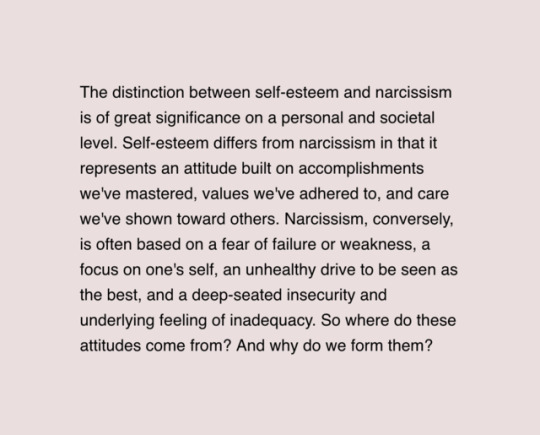



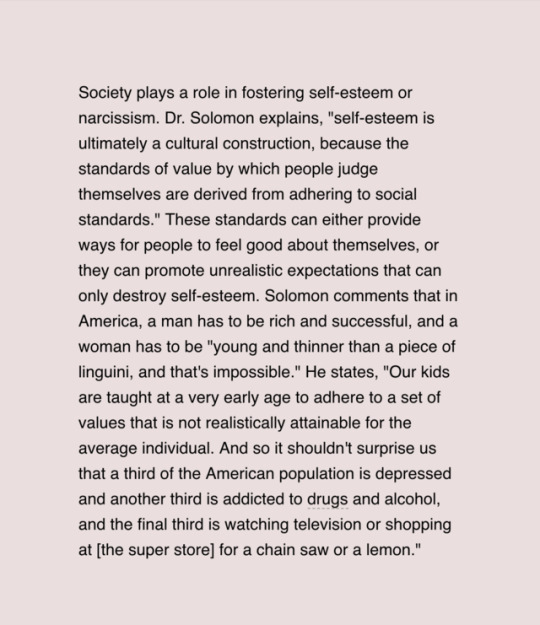
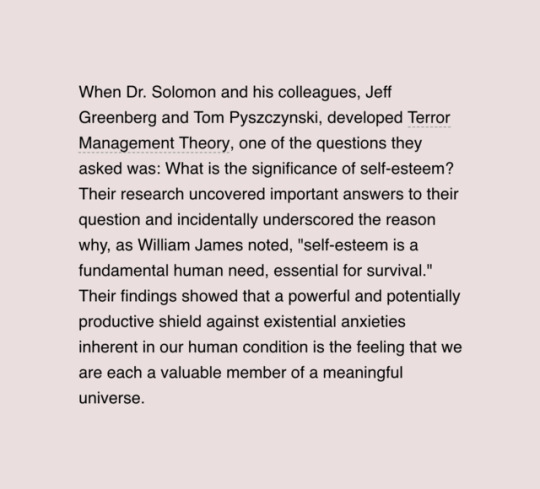
The Value of Self-Esteem and the Dangers of Narcissism
by Lisa Firestone Ph.D., via psychologytoday.com
5K notes
·
View notes
Photo

Brene Brown | @wnq-psychology
#psychology#mental health#Brene Brown#science#studyblr#therapy#mental disorder#recovery#positivity#quotes#lit#self care
1K notes
·
View notes
Quote
So instead of seeing your depression and anxiety as a form of madness, I would tell my younger self—you need to see the sanity in this sadness. You need to see that it makes sense. Of course it is excruciating. I will always dread that pain returning, every day of my life. But that doesn’t mean the pain is insane, or irrational. If you touch your hand to a burning stove, that, too, will be agony, and you will snatch your hand away as quickly as possible. That’s a sane response. If you kept your hand on the stove, it would burn and burn until it was destroyed.
Johann Hari, Lost Connections: Uncovering the Real Causes of Depression - and the Unexpected Solutions | @wnq-psychology
#Johann Hari#wordsnquotes#note to self#qotd#quoteoftheday#quotes#quote#alternative#grunge#indie#hipster#vintage#words#literature#lit#teen#teenager#love#inspiration#motivation#black and white#feelings#thoughts#advice#text#Self Improvement#Happiness#Relationships#Dating#books
3K notes
·
View notes
Quote
Reading isn’t important because it helps to get you a job. It’s important because it gives you room to exist beyond the reality you’re given. It is how humans merge. How minds connect. Dreams. Empathy. Understanding. Escape.
Matt Haig, Notes on a Nervous Planet | @wnq-psychology
#wordsnquotes#quotes#books#book quotes#booklr#bibliophile#quote#indie#hipster#vintage#words#literature#lit#teen#teenager#love#inspiration#motivation#grunge#feelings#thoughts#advice#text
15K notes
·
View notes
Photo
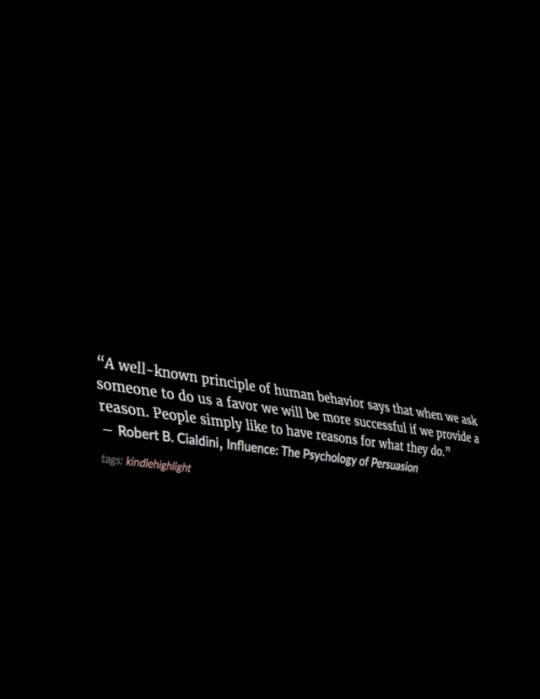
Robert B. Cialdini | @wnq-psychology
#Robert B. Cialdini#wordsnquotes#psychology#quoteoftheday#quotes#quote#alternative#grunge#indie#hipster#vintage#words#literature#lit#teenager#qotd#love#inspiration#motivation#feelings#thoughts#advice#text#note to self#quote of the day#design#typography#picture quotes
4K notes
·
View notes
Quote
"You can't cerebrate over what you can't see, which therefore becomes an object of loathing and mistrust.
Howard Portnoy, Examiner.com, 25 June 2012
Word: cerebrate
637 notes
·
View notes
Quote
“It is my opinion that the isolated mind loses its purchase on reality all too easily and becomes prone to fantasy.
Frank Tallis, A Death in Vienna
#Frank Tallis#wordsnquotes#quoteoftheday#quotes#quote#alternative#grunge#indie#hipster#vintage#words#literature#lit#teenager#qotd#love#inspiration#motivation#feelings#thoughts#advice#text#note to self
1K notes
·
View notes
Quote
If a human being is isolated from other humans for a month or more, and is confined to a small area geographically and a small range of activities, his interest in his surroundings and its minutiae increase radically....Further, if a confined, isolated human is allowed brief contacts with other humans even without a shared language, he begins to find their presence comforting, and a pleasant relief from the "evenness" of his surroundings. If these humans control his only sources of food as well as his sources of intraspecies stimulation, he may adapt to their demands in subtle and not so subtle ways. He may, given time, learn their language, take on their beliefs, etc. When we catch a dolphin and put him alone in a small tank, we are imposing similar "solitary confinement" structures on him. Maybe we can thus capture his loyalty and his initiative.
Man and Dolphin (1961), John Cunningham Lilly (6 January 1915 – 30 September 2001)
#John Cunningham Lilly#wordsnquotes#note to self#qotd#quoteoftheday#quotes#quote#alternative#grunge#indie#hipster#vintage#words#literature#lit#teen#teenager#love#inspiration#motivation#black and white#feelings#thoughts#advice#text#Self Improvement#Happiness#Relationships#Dating
1K notes
·
View notes
Quote
What is progress?
You might think that the question is so subjective and culturally relative as to be forever unanswerable. In fact, it’s one of the easier questions to answer.
Most people agree that
life is better than death.
Health is better than sickness.
Sustenance is better than hunger.
Abundance is better than poverty.
Peace is better than war.
Safety is better than danger.
Freedom is better than tyranny.
Equal rights are better than bigotry and discrimination.
Literacy is better than illiteracy.
Knowledge is better than ignorance.
Intelligence is better than dull-wittedness.
Happiness is better than misery.
Opportunities to enjoy family, friends, culture,
and nature are better than drudgery and monotony.
All these things can be measured.
If they have increased over time, that is progress.
Steven Pinker
Enlightenment Now: The Case for Reason, Science, Humanism, and Progress
#psychology#wordsnquotes#quoteoftheday#quotes#quote#alternative#grunge#indie#hipster#vintage#words#literature#lit#teenager#qotd#love#inspiration#motivation#feelings#thoughts#advice#text#note to self#Self Improvement#Happiness#steven pinker
2K notes
·
View notes
Quote
One student asks: Why should I live?
Steven Pinker answers:
In the very act of asking that question, you are seeking reasons for your convictions, and so you are committed to reason as the means to discover and justify what is important to you. And there are so many reasons to live!
As a sentient being, you have the potential to flourish. You can refine your faculty of reason itself by learning and debating. You can seek explanations of the natural world through science, and insight into the human condition through the arts and humanities. You can make the most of your capacity for pleasure and satisfaction, which allowed your ancestors to thrive and thereby allowed you to exist. You can appreciate the beauty and richness of the natural and cultural world.
As the heir to billions of years of life perpetuating itself, you can perpetuate life in turn. You have been endowed with a sense of sympathy—the ability to like, love, respect, help, and show kindness—and you can enjoy the gift of mutual benevolence with friends, family, and colleagues. And because reason tells you that none of this is particular to you, you have the responsibility to provide to others what you expect for yourself. You can foster the welfare of other sentient beings by enhancing life, health, knowledge, freedom, abundance, safety, beauty, and peace.
History shows that when we sympathize with others and apply our ingenuity to improving the human condition, we can make progress in doing so, and you can help to continue that progress.
Enlightenment Now: The Case for Reason, Science, Humanism, and Progress by Steven Pinker
"My new favorite book of all time."
-Bill Gates
"A terrific book...[Pinker] recounts the progress across a broad array of metrics, from health to wars, the environment to happiness, equal rights to quality of life."
-The New York Times
Get yours: bit.ly/2H5N0Ec
The follow-up to Pinker's groundbreaking The Better Angels of Our Nature presents the big picture of human progress: people are living longer, healthier, freer, and happier lives, and while our problems are formidable, the solutions lie in the Enlightenment ideal of using reason and science.
Is the world really falling apart? Is the ideal of progress obsolete? In this elegant assessment of the human condition in the third millennium, cognitive scientist and public intellectual Steven Pinker urges us to step back from the gory headlines and prophecies of doom, which play to our psychological biases. Instead, follow the data: In seventy-five jaw-dropping graphs, Pinker shows that life, health, prosperity, safety, peace, knowledge, and happiness are on the rise, not just in the West, but worldwide. This progress is not the result of some cosmic force. It is a gift of the Enlightenment: the conviction that reason and science can enhance human flourishing.
Far from being a naïve hope, the Enlightenment, we now know, has worked. But more than ever, it needs a vigorous defense. The Enlightenment project swims against currents of human nature--tribalism, authoritarianism, demonization, magical thinking--which demagogues are all too willing to exploit. Many commentators, committed to political, religious, or romantic ideologies, fight a rearguard action against it. The result is a corrosive fatalism and a willingness to wreck the precious institutions of liberal democracy and global cooperation.
With intellectual depth and literary flair, Enlightenment Now makes the case for reason, science, and humanism: the ideals we need to confront our problems and continue our progress.
#wordsnquotes#quoteoftheday#quotes#quote#alternative#grunge#indie#hipster#vintage#words#literature#lit#teenager#qotd#love#inspiration#motivation#feelings#thoughts#advice#text#note to self#Self Improvement#Happiness#Relationships#Dating#writing#poem#prose#spilled ink
1K notes
·
View notes
Quote
Knowing your own darkness is the best method for dealing with the darknesses of other people.
C.G. Jung
#C.G. Jung#wordsnquotes#quoteoftheday#quotes#quote#alternative#grunge#indie#hipster#vintage#words#literature#lit#teenager#qotd#love#inspiration#motivation#feelings#thoughts#advice#text#note to self#wnq psychology#psychology
2K notes
·
View notes
Photo




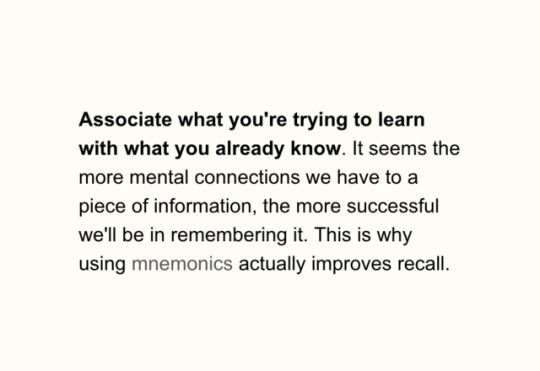

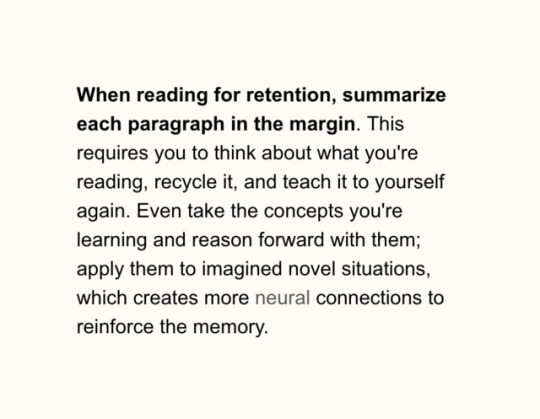

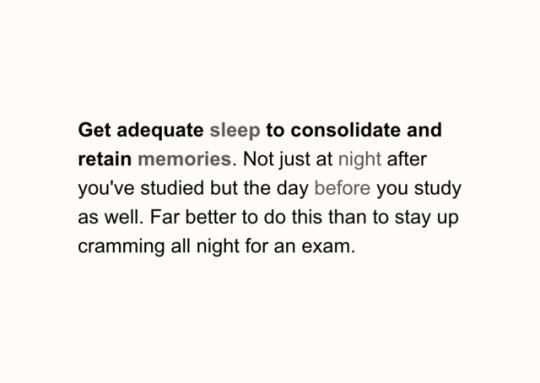
Eight Ways to Remember Anything by Alex Lickerman M.D.
Reference: Research-based strategies to boost your memory and keep it strong via psychology today
58K notes
·
View notes
Photo

Reciprocity | @wnq-psychology | @fyp-psychology
From the Poster Series: Science of Persuasion
via @fy-perspectives
#quoteoftheday#Reciprocity#word of the day#word#words#psychology#psycholgical#theory#design#typography#fy perspectives#A Abraham#fyp psychology#wnq psychology#wordsnquotes#wnq words#note to self#qotd#quotes#quote#alternative#grunge#indie#hipster#vintage#literature#lit#teen#teenager#love
6K notes
·
View notes
Quote
“Intelligence is one of the greatest human gifts. But all too often a search for knowledge drives out the search for love. This is something else I've discovered for myself very recently. I present it to you as a hypothesis: Intelligence without the ability to give and receive affection leads to mental and moral breakdown, to neurosis, and possibly even psychosis. And I say that the mind absorbed in and involved in itself as a self-centered end, to the exclusion of human relationships, can only lead to violence and pain.
Daniel Keyes | @wnq-psychology
#Daniel Keyes#wordsnquotes#quoteoftheday#quotes#quote#alternative#grunge#indie#hipster#vintage#words#literature#lit#teenager#qotd#love#inspiration#motivation#feelings#thoughts#advice#text#note to self#psychology#mihnd#intellegence
3K notes
·
View notes
Photo
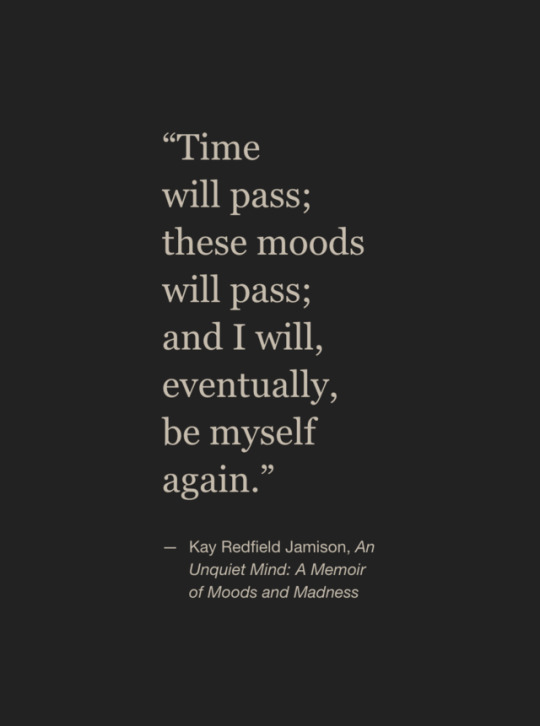
Kay Redfield Jamison | @wnq-psychology | @fyp-psychology
#wordsnquotes#note to self#qotd#quoteoftheday#quotes#quote#indie#hipster#vintage#psychology#words#literature#lit#teen#teenager#love#inspiration#motivation#black and white#grunge#feelings#thoughts#advice#text#Self Improvement#Happiness#Relationships#Dating#love quotes#pale grunge
17K notes
·
View notes
Photo
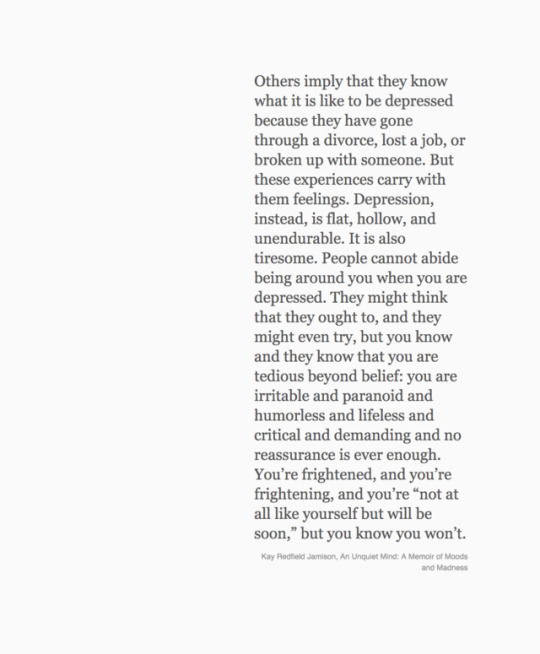
Kay Redfield Jamison | @wnq-psychology
#wordsnquotes#note to self#qotd#quoteoftheday#quotes#quote#indie#hipster#vintage#words#literature#lit#teen#teenager#love#inspiration#motivation#black and white#grunge#feelings#thoughts#advice#text#Self Improvement#Kay Redfield Jamison
10K notes
·
View notes
Quote
“Loneliness isn’t the physical absence of other people, he said—it’s the sense that you’re not sharing anything that matters with anyone else. If you have lots of people around you—perhaps even a husband or wife, or a family, or a busy workplace—but you don’t share anything that matters with them, then you’ll still be lonely.
Johann Hari | @wnq-psychology
Lost Connections: Uncovering the Real Causes of Depression – and the Unexpected Solutions
#Johann Hari#wordsnquotes#note to self#qotd#quoteoftheday#quotes#quote#indie#hipster#vintage#words#literature#lit#teen#teenager#grunge#feelings#thoughts#advice
15K notes
·
View notes